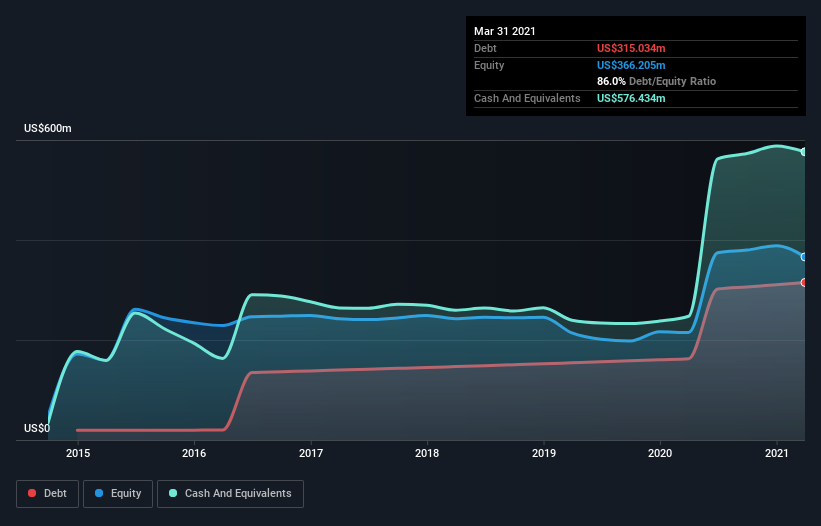Is Nevro (NYSE:NVRO) Using Too Much Debt?
Some say volatility, rather than debt, is the best way to think about risk as an investor, but Warren Buffett famously said that 'Volatility is far from synonymous with risk.' It's only natural to consider a company's balance sheet when you examine how risky it is, since debt is often involved when a business collapses. Importantly, Nevro Corp. (NYSE:NVRO) does carry debt. But the real question is whether this debt is making the company risky.
What Risk Does Debt Bring?
Generally speaking, debt only becomes a real problem when a company can't easily pay it off, either by raising capital or with its own cash flow. Ultimately, if the company can't fulfill its legal obligations to repay debt, shareholders could walk away with nothing. However, a more usual (but still expensive) situation is where a company must dilute shareholders at a cheap share price simply to get debt under control. By replacing dilution, though, debt can be an extremely good tool for businesses that need capital to invest in growth at high rates of return. When we think about a company's use of debt, we first look at cash and debt together.
Check out our latest analysis for Nevro
What Is Nevro's Debt?
As you can see below, at the end of March 2021, Nevro had US$315.0m of debt, up from US$162.4m a year ago. Click the image for more detail. However, it does have US$576.4m in cash offsetting this, leading to net cash of US$261.4m.
A Look At Nevro's Liabilities
The latest balance sheet data shows that Nevro had liabilities of US$246.4m due within a year, and liabilities of US$163.1m falling due after that. Offsetting this, it had US$576.4m in cash and US$66.1m in receivables that were due within 12 months. So it can boast US$233.1m more liquid assets than total liabilities.
This short term liquidity is a sign that Nevro could probably pay off its debt with ease, as its balance sheet is far from stretched. Succinctly put, Nevro boasts net cash, so it's fair to say it does not have a heavy debt load! The balance sheet is clearly the area to focus on when you are analysing debt. But ultimately the future profitability of the business will decide if Nevro can strengthen its balance sheet over time. So if you're focused on the future you can check out this free report showing analyst profit forecasts.
In the last year Nevro had a loss before interest and tax, and actually shrunk its revenue by 8.2%, to US$363m. That's not what we would hope to see.
So How Risky Is Nevro?
Statistically speaking companies that lose money are riskier than those that make money. And the fact is that over the last twelve months Nevro lost money at the earnings before interest and tax (EBIT) line. Indeed, in that time it burnt through US$8.2m of cash and made a loss of US$88m. While this does make the company a bit risky, it's important to remember it has net cash of US$261.4m. That means it could keep spending at its current rate for more than two years. Even though its balance sheet seems sufficiently liquid, debt always makes us a little nervous if a company doesn't produce free cash flow regularly. There's no doubt that we learn most about debt from the balance sheet. But ultimately, every company can contain risks that exist outside of the balance sheet. For example, we've discovered 2 warning signs for Nevro that you should be aware of before investing here.
If you're interested in investing in businesses that can grow profits without the burden of debt, then check out this free list of growing businesses that have net cash on the balance sheet.
This article by Simply Wall St is general in nature. It does not constitute a recommendation to buy or sell any stock, and does not take account of your objectives, or your financial situation. We aim to bring you long-term focused analysis driven by fundamental data. Note that our analysis may not factor in the latest price-sensitive company announcements or qualitative material. Simply Wall St has no position in any stocks mentioned.
Have feedback on this article? Concerned about the content? Get in touch with us directly. Alternatively, email editorial-team (at) simplywallst.com.

